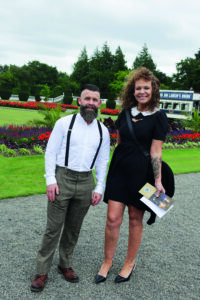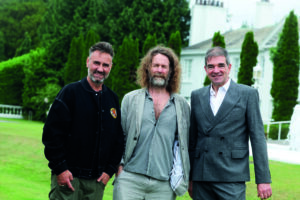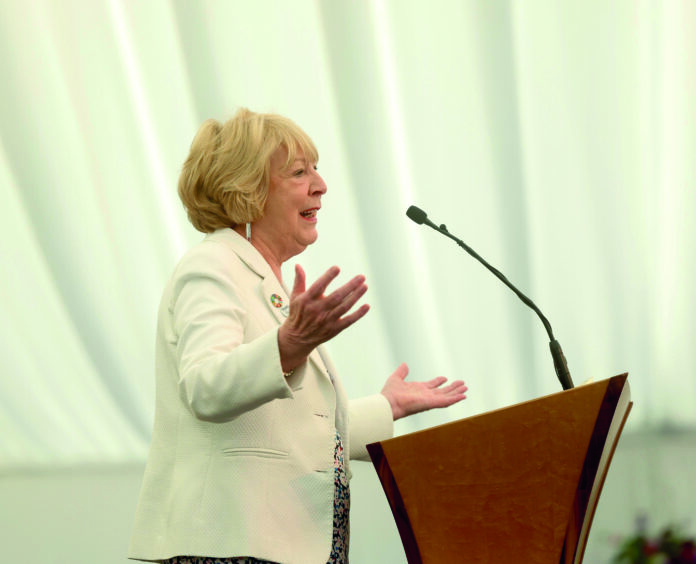President Higgins and Sabina have been enthusiastic upholders of the annual series of summer garden parties at the Áras, a tradition initiated by the first President of Ireland, Douglas Hyde.
 The garden parties are offered as a tribute to people and organisations making a positive difference, and whose work reflects the thematic priorities of the presidency.
The garden parties are offered as a tribute to people and organisations making a positive difference, and whose work reflects the thematic priorities of the presidency.
As per the tradition, in 2023 President Michael D and Sabina opened up the historical Áras and its gorgeous surrounds for a series of garden parties, hosting afternoon tea in a beautiful marquee, and treating their guests to musical entertainment, plus an inspiring speech specifically addressing the concerns of the group attending that day.
At the fourth garden party of 2023, on 27 June, the President and Sabina welcomed community members, activists, and all those dedicated to fostering a sustainable future for citizens in Ireland and beyond.
President Higgins wasn’t well on the day of the Biodiversity and Sustainability Garden Party, so in a first-ever, Sabina addressed the audience that day, giving a passionate rendition of the president’s speech.
In honour of the extraordinary work of the President and Sabina Higgins in promoting biodiversity and sustainability, we reprint most of their speech here.


Presidential Speech
At the Cherishing our Biodiversity and Sustainability Garden Party, 27 June 2023, delivered by Sabina Higgins
“We are most happy to extend a warm welcome to community members, activists, and all those who have been dedicating themselves and committing to fostering a sustainable future for our citizens in Ireland and beyond.
May I also acknowledge the remarkable efforts of individuals involved in various campaigns including on climate justice, gender equality, and the eradication of global hunger.
The moral leadership and unstinting efforts of all those working towards the creation of a sustainable society and economy, surely given our circumstances, represent the best expressions of an active, engaged and inclusive citizenship, one that demonstrates a commitment to a real Republic, founded on principles of equality, participation, solidarity and recognition of the dignity of all citizens.
We recognise your work, acknowledge it, salute it this afternoon, and invite you to enjoy the house and the grounds of Áras an Uachtaráin, the home of all Irish presidents since 1938.
While today is indeed a day of celebration, I feel it would be remiss of me if I didn’t take a moment to reflect on the global context we share, and seek your engagement in the current circumstances in which we find ourselves.
The sobering truth is that our planet is in crisis. The scientific evidence is clear and unequivocal – Planet Earth is burning, a result of human economic actions, taken most often by those with power in the economy, and the consequences falling most acutely on the most vulnerable, who are least responsible for climate change.
In the words of Pope Francis:
‘Our common home is being pillaged, laid waste and harmed with impunity. Cowardice in defending it is a grave sin.’
Our beautiful planet, once teeming with life and vibrant ecosystems, is now facing unprecedented destruction. Our actions have pushed the Earth to the brink, and it is time for us to act with urgency and determination to reverse this course.
Recent research published by Queen’s University Belfast tells us that almost half of Earth’s species are ‘now in decline’, and that the planet appears to be entering its sixth mass extinction period. Unlike previous mass extinctions, this one is a direct consequence of human activity.
Furthermore, according to the Intergovernmental Panel on Climate Change (IPCC), we are on track for a global temperature increase of over 1.5 degrees celsius above pre-industrial levels by the end of this century.
This rise in temperature will result in catastrophic consequences, including more frequent and intense heatwaves, extreme weather events, rising sea levels, failed crops, hunger, and the displacement of millions of people. We cannot afford to continue to ignore these concerns.
The consequences of a flawed interconnection between ecology, economy, and society are evident to everyone. Disturbing climate shifts are exerting immense pressure on communities worldwide, where ecosystems are no longer capable of sustaining populations, resulting in a depletion of resources necessary for human well-being and progress. Consequently, this lays the foundation for conflict, violence, and involuntary migration and displacement. Vulnerable groups face the harshest and most immediate consequences, as their very survival hangs in the balance.
There are alternatives available, combining ecology, justice and good economics. It is time to face the truth, to acknowledge the challenges we face, and to embrace the shared responsibility of creating a better future for all. The repercussions of our choices taken now will define habitable life itself for generations to come.
But as we face this daunting reality, let us not succumb to despair. There is hope, for we possess the power to make a difference. We still have a chance to avert the worst effects of climate change. To do so, we must act urgently and decisively.
We must channel our collective will and determination towards sustainable solutions. It is time for a paradigm shift, a change in mindset that prioritises the well-being of our planet over short-term gains.
Each one of us, regardless of our individual roles, families, communities, or professions, must take ownership of the commitment to tackle climate change. As citizens, we possess a moral duty to contribute to this profound societal transformation, invoking our shared humanity to re-establish a harmonious relationship between ecology, ethics, economy, culture, and a lived experience of fulfilment and resonance with each other and the world.
In Ireland, we have a critical role to play in this global effort. We must show leadership in the transition to a sustainable future by committing to the United Nations Sustainable Development Goals, and achieve our targets as set out in the Paris Agreement, by reducing our greenhouse gas emissions and protecting and restoring our natural ecosystems.
In Ireland we still have a long way to go, as the recent trends show that our emissions are rising while most European countries are experiencing a decline. The latest data from the Environmental Protection Agency indicate that the water quality in our country’s rivers and lakes has decreased – which is contributing to our national biodiversity decline.
We must face up to our need to make the bold decisions that are required to protect, conserve and restore the natural environment in the interest of all of the people, present and future, not just on the island of Ireland, but across our planet. We must achieve this through dialogue and, more importantly, we need to have strategies of implementation that are understood.
Here at Áras an Uachtaráin, with the assistance of Trinity College Dublin scientists and the Office of Public Works, we have had a biodiversity audit as a basis for future action. Nearly 300 species of plant, 200 species of fungi, more than 50 species of bird, and nearly 250 species of invertebrates have been identified on the grounds of Áras an Uachtaráin.
We are implementing measures to improve and restore species-rich grasslands, creating habitats in which insects, pollinators, birds and mammals can nest. Swift boxes have been installed, measures to encourage bat roosting have been undertaken, and new beehives are now in the vegetable garden.
We must also recognize that climate change is not just an environmental issue, but also a social and economic one. An ecological-social paradigm encompasses the need for a just transition for those impacted by the closure of unsustainable carbon-intensive industries. We must ensure that the transition to a low-carbon economy is just and equitable, and that no one is left behind.
As I look around today, I welcome the fact that citizens actively engaged in promoting a sustainable existence embody our best hope for survival in a world characterized by harmony, peace, and coexistence with nature, nurturing a diverse ecosystem and a thriving planet.
This contrasts with the destructive model of the past, driven by rampant consumer culture, wastefulness, and an individualistic mindset, reinforced by the dominance of neoliberalism as the prevailing political and economic ideology.
Our insatiable appetite for resources, our being consumed with consumption, has pushed countless species to the brink of extinction, disrupting delicate ecosystems. The loss of biodiversity not only threatens the natural world but also jeopardises our own survival.
New movements are emerging, offering societal emancipation and a sustainable ethical society. Their widespread adoption is crucial for global solidarity and our best hope for a more equal, cohesive, and sustainable future, one that will protect and preserve the diversity of life on Earth.
On climate change and biodiversity loss, there is a clear, definitive and ineluctable ethical imperative to act. We must take our role as stewards of the Earth, driven by the conviction that sustainability, climate change mitigation, and biodiversity conservation are not optional endeavours but moral imperatives.
Let us unite in purpose, and create a legacy of hope for generations to come.”







